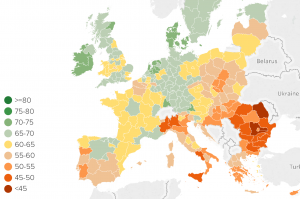Social progress in Europe is concentrated to the north. Regions from three Scandinavian countries, Sweden, Denmark and Finland, and nearby Netherlands dominate the first ever European Union Regional Social Progress Index released by Social Progress Imperative (SPI) – taking up the first 30 of 272 total slots, led by:
1. Upper Norrland, Sweden (82.33);
2. Central Jutland, Denmark (81.98);
3. Capital Region of Denmark, Denmark (81.67);
4. Aland, Finland (81.61);
5. Utrecht, Netherlands (81.37);
6. Northern Jutland, Denmark (81.36);
7. Helsinki, Finland (81.19);
8. Gelderland, Netherlands (81.11);
9. North Holland, Netherlands (80.95); and,
10. Groningen, Netherlands, (80.55).
The 272 regions represent the Nomenclature of Units for Territorial Statistics (NUTS), a geocode subdivision developed by the European Union (EU) for the 28 member countries. The European index, like other indexes developed by SPI, is based on numerous criteria including basic medical care, water and sanitation, environment and personal rights.
The rankings are intended to be a “practical tool to help people,” said SPI CEO Michael Green. SPI leaders intend to release future rankings, ideally every two or three years, but must coordinate with the European Commission to determine the most appropriate timeframe.
The strength of Scandinavian countries and the Netherlands is two-fold, according to Green. One, the nations are particularly strong in areas of social rights and freedom of choice. Regions from the four countries take up the entirety of the top 30 regions based on personal rights, as defined by SPI, and 20 of the top 21 slots for personal freedom and choice.
Second, Sweden, Denmark, Finland and Netherlands are also very strong in consistency of social progress throughout regions of the countries. Not only do the nations consist of regions that make up the top 30 scores, but none of the countries have NUTS regions outside the top 30. Similar national consistency can be found in countries such as Germany and the UK, where – despite perceptions around Brexit that quality of life was disproportionately better near cities – is actually fairly evenly spread out, according to Green. All 37 UK regions fell between the 88th and 49th percentiles of the index.
Much of the index’s findings can be illustrated with a color-coded map – the high progress nations in dark green up top turning to light green in and around Germany to yellows further south by Italy and Spain and then red and orange further east in lower-ranked countries such as Romania and Bulgaria. Regions in Romania and Bulgaria made up the bottom 14 spots. Green distinguished the nations as former Communist Block countries that are relatively new to the EU and thus have room to improve in areas such as social opportunity.
“The optimistic view is that these things can be fixed quite quickly with the right policies,” Green said. “The question is whether they can be pushed on.” Green cited former Communist Block countries including Poland and Hungary that have quickly picked up steam after similar beginnings. Generally, Central European nations have surpassed southern nations in metrics like education, with areas such as tolerance and inclusion still lagging behind.
The UK’s scheduled exit from the EU colors the rankings. Green noted that, while the nation at large is fairly consistent, areas in western England and Wales are particularly strong. Whether that is a product of English and Welsh government or EU regional support isn’t quite clear. “Certainly, they’re doing well under the existing system,” Green said. “You have to ask if they’ll do so well under a new system.”
The UK was among the largest contributor nations to the EU and its exit will have repercussions throughout the union. Without it, other high-paying countries such as Germany and France will either have to pay more or smaller recipient nations will be given fewer resources, Green noted.
